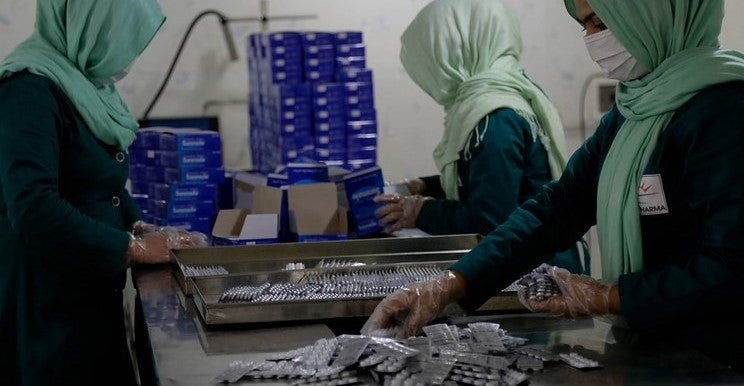 Women packaging medicine at Juma Muhammadi Industrial Park, Bagrami, Kabul, Afghanistan. Photo: © Abbas Farzami / Rumi Consultancy / World Bank
Women packaging medicine at Juma Muhammadi Industrial Park, Bagrami, Kabul, Afghanistan. Photo: © Abbas Farzami / Rumi Consultancy / World Bank
Panic buying is one of the top headlines of the COVID-19 (coronavirus) pandemic. This international phenomenon threatens health systems’ ability to prevent and treat the coronavirus with shortages of hand sanitizers, masks, and pain relievers. Panic buying of potential treatments may also deplete medicines for patients with chronic diseases – chloroquine and hydroxychloroquine remain unproven for COVID-19, but are vital medicines for autoimmune conditions such as lupus.
While the pandemic has drastically altered our routines, it has also created a renewed sense of community. The connectedness began as people voiced their concerns with panic buying and its impact on vulnerable populations due to underlying socioeconomic inequalities.
What about the vulnerable?
Times of crisis underscore the disparities between the haves and the have-nots, the physically able and the disabled, the young and the elderly. To protect citizens with reduced mobility, households that regularly run out of food before the end of the month, or those who can only afford to stockpile when prices are lower than usual, policy interventions may be necessary.
To address the detrimental impact of panic buying, some stores are rationing essential items and modifying their opening hours to prioritize vulnerable customers such as health care workers and the elderly.
But panic buying is not limited to grocery stores and pharmacies as we experience it in many Western countries. It also presents a serious threat to ongoing global efforts to reach Sustainable Development Goal 3.8 by 2030: to ensure “access to quality essential health care services and access to safe, effective, quality and affordable essential medicines and vaccines for all.”
Panic buying in the global health supply chain
Governments all over the globe are trying to secure masks, protective equipment, and ventilators while stocking up and rationing other medicines to respond to supply chain disruptions. Suppliers are overwhelmed with demand, raw material shortages are driving prices up, and political pressure is higher than ever.
The pandemic has led to a market failure where high demand meets limited supply. It is now a “seller’s market,” in which suppliers and distributors have established new terms and conditions for buyers, including:
- Payment terms with high financial risks, such as 50% upfront payments, with balances due once the merchandise leaves the warehouse.
- Delivery delays, due to practices such as filling orders out of sequence and moving the highest-paying customers to the front of the line.
- Excessive mark-ups, with distributors accused of stockpiling goods to create perceived shortages and selling later at inflated prices.
- Reduced access to known, quality-assured manufacturers, with national governments limiting or banning exports to protect national supplies.
This new economic model offers a significant advantage to the wealthiest economies on the global pharmaceutical market. It is exacerbated by panic buying from high-income countries, which further reduces access to affordable and quality-assured medicines for low- and middle-income countries (LMICs).
Following the 2014 West Africa Ebola outbreak, researchers reported that a lack of medical supplies and personal protective equipment led to an increased rate of infections and poor control of the epidemic. Now, with countries trying to purchase similar products for their own national systems, LMICs are facing greater risks of medical product shortages, putting millions of health workers and patients at risk.
A proliferation of substandard and falsified medical products
The coronavirus pandemic is also worsening the ongoing problem of substandard and falsified medicine. On March 31, the World Health Organization published a Medical Product Alert to “warn consumers, health care professionals, and health authorities against a growing number of falsified medical products that claim to prevent, detect, treat or cure COVID-19.”
Besides potentially leading to delays in proper diagnosis and treatment, health scams can be harmful and even fatal to patients. As an example, the rise in the sale of expensive counterfeit face masks and surgical gloves in Egypt presents a serious public health threat against the spread of COVID-19.
Health scams also have an economic impact on LMICs where resources are already scarce. The economic loss to governments and patients’ loss of income increases socioeconomic inequalities and worsens health outcomes for patients.
Medical product shortages created by panic buying present opportunities for fraudsters to “fill the gaps” as buyers diversify their sourcing beyond their pre-existing networks. New suppliers may include ones that have previously been denied authorization. Urgency and the inability of authorities to travel for field audits of manufacturing sites expose health systems to fake medicines and medical products. While regulators know the risks, political pressure to deliver goods can lead to fast-track approval of new medical products.
Even in countries considered Stringent Regulatory Authorities, markets have been flooded with counterfeit health and sanitary products. In early March, Europol (the EU's law enforcement agency) confiscated 34,000 counterfeit surgical masks in just one coordinated operation. The agency also reported that:
- A European firm ordered some €6.6 million ($7.3 million) worth of protective masks and disinfection gel from a company in Singapore — which never arrived.
- A German government shipment of millions of masks from Kenya never turned up.
- The Netherlands recently recalled millions of defective masks bought from China.
What can be done?
For several years, the World Bank has worked with National Medicines Regulatory Authorities (NMRAs) across Sub-Saharan Africa to strengthen regulatory systems. One of the main objectives is to increase regional collaboration. The COVID-19 pandemic underscores the importance of information sharing between countries, especially about product availability and pricing, as well as fraudulent manufacturers.
As a global community, to reduce the risks of drug shortages and health scams, we can advocate for:
- Increased market surveillance and more support from law enforcement agencies in LMICs to identify fraudsters (such as in Uganda).
- Intensified public health messages from NMRAs and pharmaceutical associations on safe and evidence-based medical practices.
- Global recognition of the impact that high-income countries’ panic buying has on less wealthy economies.
- Lifting of export bans on protective equipment and other potentially life-saving medical products (such as in Germany).
The World Bank is also collaborating with partners to provide procurement support to LMICs affected by the pandemic. Countries experiencing sourcing challenges are connected to World Bank distributors, and medical experts are providing guidance on selection and use of the most cost-effective equipment.
COVID-19 has aggravated global socioeconomic inequalities, but how we respond to panic buying could actually bring us together. We can all promote actions – in our communities and from our governments – that address inequalities. With so many lives at stake, we need to work together more than ever for a world where everyone has access to affordable, quality-assured medical products.
For further information:
- Shoman H, Karafillakis E, Rawaf S. The link between the West African Ebola outbreak and health systems in Guinea, Liberia and Sierra Leone: a systematic review
- Adepoju P. African nations to criminalise falsified medicine trafficking. Lancet (London, England). 2020 Feb 1;395(10221):324.
- World Health Organization (WHO). A study on the public health and socioeconomic impact of substandard and falsified medical products. 2017. Available from: http://apps.who.int/bookorders.


Join the Conversation